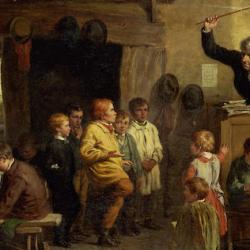David I. Smith and Susan M. Felch (Teaching and Christian Imagination) want to rehabilitate the symbolism of “gardening” as a model of education.
It does require rehabilitation, not least because of Rousseau, who wrote: “God makes all things good. . . . [but] man meddles with them and they become evil. He forces one soil to yield the products of another, one tree to bear another’s fruit . . . He destroys and defaces all things; he loves all that is deformed and monstrous; he will have nothing as nature made it, not even man himself, who must learn his paces like a saddle-horse, and be shaped to his master’s taste like the trees in his garden” (Emile, quoted 90-1).
Rousseau is still alive and kicking, as a quotation from a “more recent educationist” indicates: “A garden is not, except in so far as it contains plants, a ‘natural environment.’ Rather, it is a contest, man’s taming of nature, in which plants are placed, shaped, bred and cross-bred in accordance with human notions of form and order. . . . There is more than a hint here . . . of authoritarianism” (Robin Alexander, quoted 91).
Smith and Felch counter by noting the “biblical trajectory from Eden to New Jerusalem,” and with the observation that gardens are themselves proto-civic: “a garden is not a wilderness untouched by human hands: God’s command to tend Eden is given immediately after his creation of Adam and Eve. This command demands cultivation, the beginning of human culture. Nor are building inert objects devoid of creativity, beauty, and life. Gardens and buildings both require construction and are meant to be inhabited and maintained. When we think about gardens and buildings as complementary metaphors, we recognize that they often share on feature in common: they both have walls” (161).











